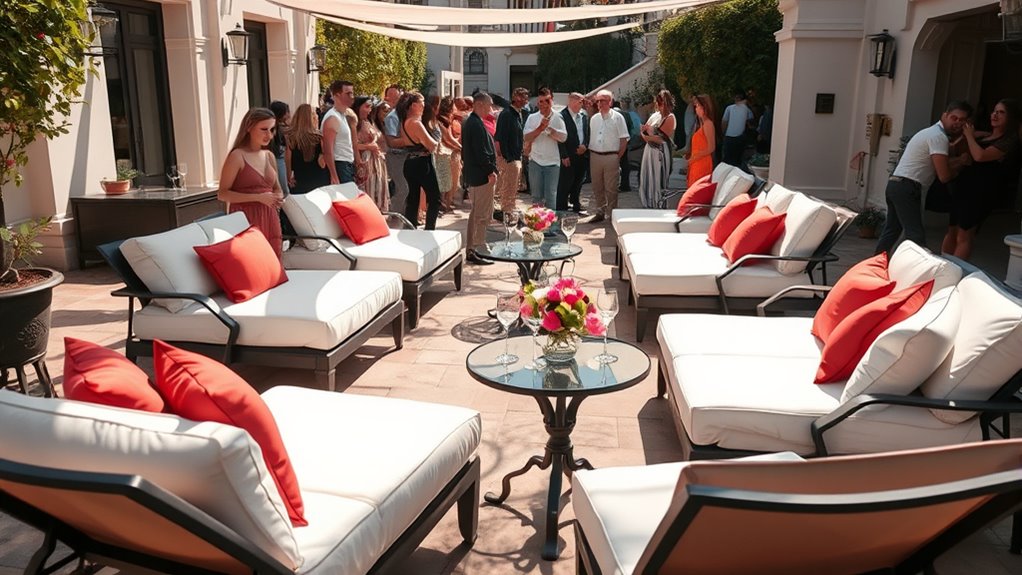When using daybeds and loungers, respect others’ space by not sprawling or intruding and keep belongings contained. Reserve seats with visible cues like bags, but limit holding time to avoid blocking others. Always check if policies favor fair access, and avoid monopolizing space. Be courteous by limiting noise and maintaining cleanliness, ensuring everyone can enjoy the area comfortably. Keep these guidelines in mind to foster a respectful environment—more tips follow for smooth lounging.
Key Takeaways
- Respect personal space and visual cues when using or reserving daybeds and loungers.
- Limit seat saving to 5-15 minutes with visible indicators like bags or markers.
- Avoid touching or moving others’ belongings; check with staff for disputes.
- Keep loungers and daybeds clear when leaving for extended periods to allow fair access.
- Follow venue policies on reservation time frames and proper maintenance for shared furniture.
Understanding Daybed Usage and Respecting Space
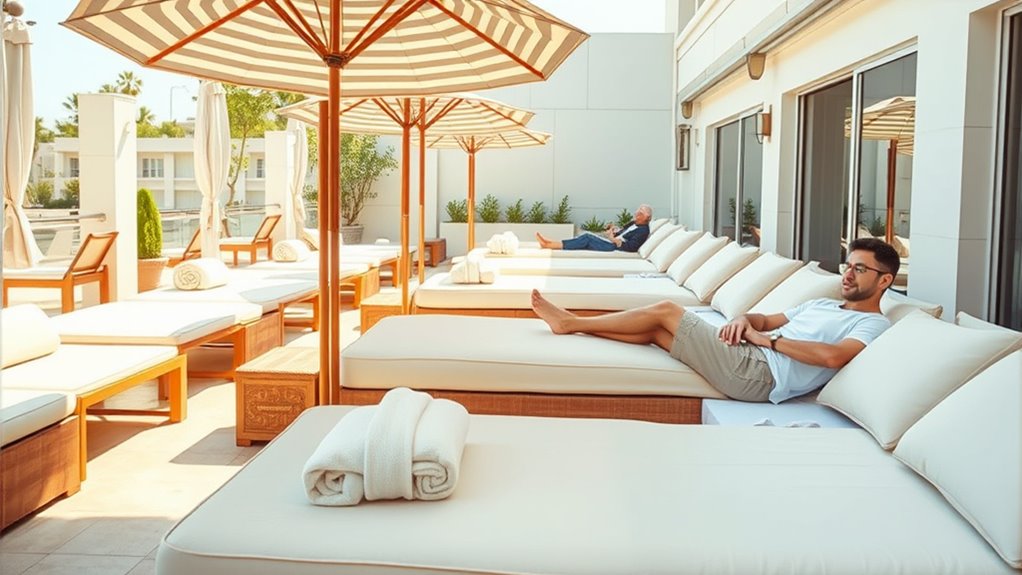
Understanding how to use daybeds respectfully starts with recognizing their dual purpose. During the day, they serve as seating, while at night, they become sleeping surfaces. This dual function means you should respect personal space boundaries and avoid intruding on others’ designated zones. Keep belongings contained and avoid sprawling or leaning on the daybed uninvited. Visual cues like cushions or throws can subtly signal whether the space is occupied or reserved. Be aware of the environment’s purpose—whether for guests or resting—and adjust your behavior accordingly. Maintaining clear boundaries helps prevent discomfort and accidental invasions. Proper etiquette when sharing a daybed encourages a considerate and comfortable experience for everyone involved. Remember, a respectful attitude toward the daybed’s role ensures everyone can enjoy the space comfortably, whether sitting, lounging, or sleeping.
Proper Etiquette for Reserving and Using Loungers
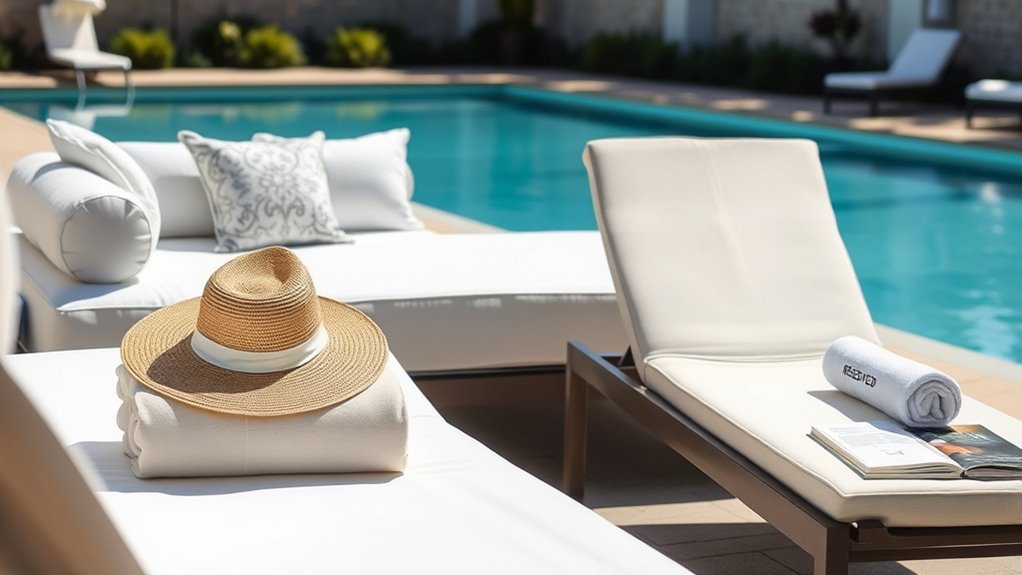
Proper etiquette for reserving and using loungers guarantees everyone can enjoy poolside comfort without conflict. To do this, follow these guidelines:
Respect poolside etiquette: leave belongings, set time limits, and communicate to ensure everyone’s comfort.
- Leave personal belongings on your lounger if you step away briefly, signaling occupancy.
- Have someone stay behind to guard the space if you need a longer break.
- Avoid touching or moving others’ belongings; instead, speak with staff if a dispute arises.
- Respect time limits, usually 30 minutes to an hour, and don’t hold loungers indefinitely without use.
- Recognize that some resorts have specific policies on reserving loungers, so always check destination policies beforehand.
- Be aware that some resorts monitor lounger reservations via staff or signage to ensure fair use.
Guidelines for Saving Seats Fairly and Considerately

To save seats fairly, keep your spot within a reasonable time frame and avoid lingering too long. Use clear indicators like bags or personal items to signal your reservation, but don’t rely solely on them. Always respect others’ access, and be ready to release seats if your plans change or others need to sit. Remember, no more than one seat should be saved per person already seated to maintain fairness. Additionally, understanding farmhouse bedroom design principles can help create a welcoming environment if you’re hosting gatherings in a cozy, rustic setting.
Limit the Time Frame
Setting clear time limits for saving seats helps make certain everyone has a fair chance to enjoy communal spaces. When you’re saving a spot, keep these guidelines in mind:
- Limit your hold time to 5-15 minutes, depending on the setting, to prevent monopolizing.
- Avoid leaving seats unattended for long periods, especially in busy areas like pools or beaches.
- If you need to step away briefly, consider using a visible placeholder or inform others of your return plan.
- Be mindful of venue rules—many places enforce specific time frames, like 1.5 to 2.5 hours in restaurants or shorter in public pools. Following these helps guarantee fairness and keeps the space available for everyone.
- Implementing clear policies about seat saving can further promote fairness and prevent misunderstandings.
Use Clear Indicators
Using clear indicators is essential for managing seat saving fairly and considerately. Signage helps set expectations, so everyone understands whether saving seats is allowed. Visual cues like flags or markers can quickly show which seats are reserved, reducing confusion. Displaying time limits for saving seats prevents people from holding spots indefinitely and encourages fairness. Designing seating areas with this in mind, such as avoiding overly isolated spots, discourages unnecessary saving. Establishing community norms around seat saving also promotes respectful behavior. Clear indicators guide users to follow rules without ambiguity, making shared spaces more comfortable. Implementing security zone information can help maintain order and trust among users. When everyone understands the signals and expectations, it minimizes disputes and fosters a considerate environment for all.
Respect Others’ Access
Respecting others’ access to seating is essential for maintaining a fair and welcoming environment in public spaces. When you save a seat, think about how your actions affect others. Consider these points:
- Imagine someone arriving, searching for a spot, only to find yours taken without a valid reason.
- Visualize a crowded restaurant where close tables make diners uncomfortable, emphasizing the need for space.
- Picture a public meeting where remaining seated shows respect for the speaker and order.
- Envision an event where fair seating arrangements foster positive social interactions.
- Remember that contrast ratio impacts how well images are perceived, just as fair seating ensures everyone can enjoy the event clearly and comfortably.
Poolside Behavior and Maintaining a Peaceful Environment

Keeping noise levels down and maintaining cleanliness are essential for a peaceful poolside experience. When everyone respects quiet hours and keeps the area tidy, it helps guests relax and enjoy their time. Your mindful behavior can make the environment more enjoyable for all. Additionally, many people believe that respecting shared spaces contributes to a more pleasant atmosphere for everyone involved. Proper drivetrain maintenance, such as avoiding cross-chaining and practicing smooth gear shifts, can also help maintain a safe and enjoyable environment for all riders in a shared space.
Noise Control Standards
Maintaining a peaceful poolside environment requires everyone to be mindful of noise levels and adhere to local regulations. To keep the tranquility, consider these practices:
- Keep conversations quiet and avoid shouting or loud music near the pool to prevent disturbing neighbors.
- Use headphones when listening to personal audio devices so sound doesn’t carry across the area.
- Limit noise from toys, floats, or group activities during early mornings and late evenings, respecting noise ordinances.
- Ensure pool equipment like pumps and filters are placed away from shared property lines or shielded with soundproof barriers.
- Regularly assess and adjust the placement of equipment to minimize noise impact and maintain a calm environment. Space and organization
Installing natural buffers like shrubs and fences also helps dampen noise. Follow designated hours and avoid amplified sounds after curfew, creating a relaxing space for everyone.
Cleanliness and Hygiene
Ensuring poolside cleanliness isn’t just about appearances; it directly affects the health and safety of everyone in the water. Swimmers introduce about 0.14 grams of fecal matter, and nearly 70% skip showers before swimming, adding oils, sweat, and skin cells. Urination in pools is common, with some surveys indicating up to 40% of adults do it. Swim diapers don’t fully prevent contamination, risking outbreaks of parasites like cryptosporidium. Regular testing and proper chemical levels are essential to keep water safe. Additionally, the increasing use of automation technologies in pool management can help monitor water quality more effectively.
Common Mistakes to Avoid in Lounge and Pool Areas
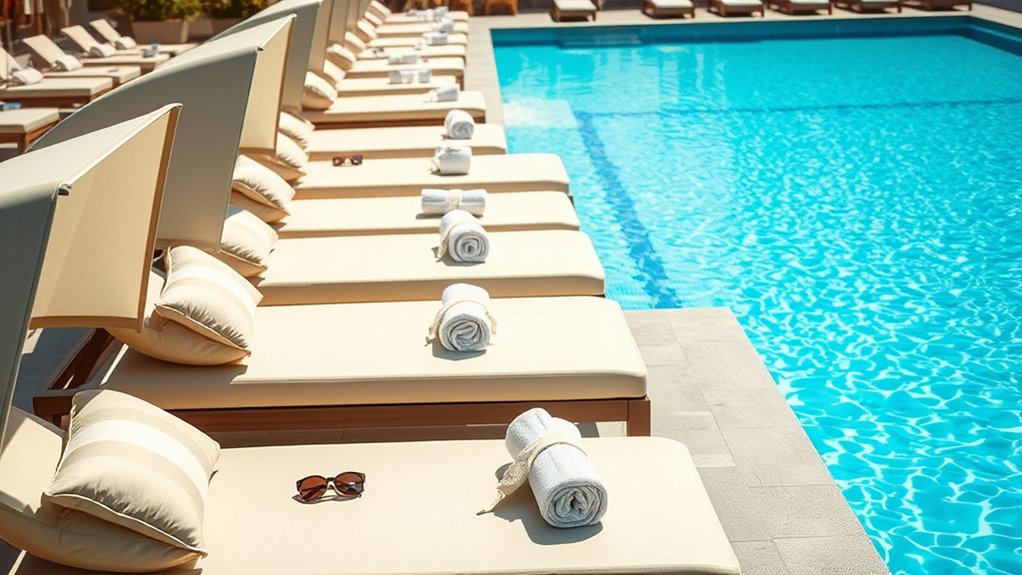
One of the most common mistakes in lounge and pool areas is disregarding noise and music etiquette, which can disturb others’ relaxation. Personal music speakers, including Bluetooth devices, should be avoided because they disrupt the peaceful environment. Keep volume levels very low or refrain from using audio devices altogether. Imagine others trying to unwind, only to be jolted by loud music or conversations. Playing music loudly through speakers can ruin the tranquil atmosphere for everyone. To avoid issues, remember: 1. Don’t use personal speakers that disturb others. 2. Limit noise levels to maintain a tranquil vibe. 3. Don’t reserve loungers long-term with belongings. 4. Avoid leaving items for extended periods to ‘save’ seats. Being considerate helps everyone enjoy a relaxing experience. Also, understanding guest behavior and local policies can help prevent conflicts and ensure a respectful environment.
Rules and Policies for Reserving and Holding Daybeds and Loungers

To make the most of your poolside experience, it’s important to understand the rules and policies around reserving and holding daybeds and loungers. Typically, you’ll need to pre-pay in full, including taxes and fees, to secure a reservation. Check-in usually happens between 9 AM and 11 AM, with a photo ID and credit card required. Remember, reservations are often non-refundable unless specified otherwise. Daybeds usually have guest limits, like four people, and larger groups need cabanas. Re-entry might be restricted during events, and personal items like towels can help retain a seat, but they may be removed if abandoned. Proper swimwear and adherence to venue policies ensure a smooth, enjoyable experience for everyone. Additionally, hours of operation are from 10:00 AM to 5:00 PM daily, so planning your visit accordingly can help you make the most of your time at the pool. It’s also helpful to familiarize yourself with pool etiquette to ensure a respectful environment for all guests.
Best Practices for Ensuring Cleanliness and Hygiene

Maintaining cleanliness and hygiene for poolside furniture is essential for a safe and enjoyable experience. To keep everything in top shape, follow these best practices:
- Use a soft-bristled brush and mild detergent to gently scrub surfaces without causing damage.
- Rinse thoroughly with a garden hose to wash away soap and debris, ensuring no residue remains.
- Wipe down cushions and fabrics with microfiber cloths, and apply UV-resistant sprays to protect against sun damage.
- After cleaning or rain, dry surfaces completely and ensure good airflow to prevent mold and mildew buildup.
- Regular inspection for signs of wear or damage helps catch issues early, allowing for timely repairs that extend the furniture’s lifespan. Routine maintenance is key to keeping your poolside furniture in optimal condition.
- Proper storage during off-seasons keeps furniture dry and protected, which further reduces the risk of damage and prolongs its overall durability.
Communicating Rules and Expectations to Guests
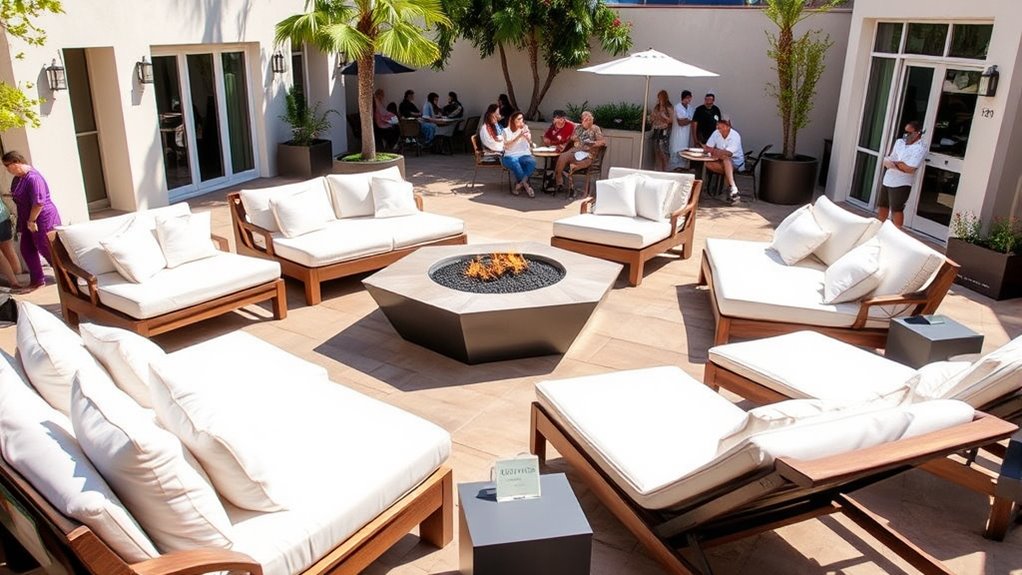
Clear communication is essential to guarantee your guests understand the house rules and expectations from the start. Be upfront about the duration of their stay, household customs, and meal arrangements. Set noise limits and outline guest responsibilities like cleaning up. To keep things clear, create a simple table:
| Rule Category | Expectations |
|---|---|
| Boundaries | Off-limits areas and personal belongings |
| Guest Limits | Maximum number of guests allowed |
| Pet & Tech Policies | Pet restrictions and technology use rules |
| Activities & Departure | Activity planning and checkout procedures |
This approach helps prevent misunderstandings and sets a respectful tone. When you communicate these expectations early, your guests will feel informed and comfortable, making their stay more enjoyable for everyone. Establishing clear rules reduces potential conflicts and fosters a positive environment for all involved. Additionally, providing written guidelines or house rule handouts can reinforce expectations and serve as a handy reference during their stay.
Enforcing Etiquette and Fostering a Respectful Atmosphere
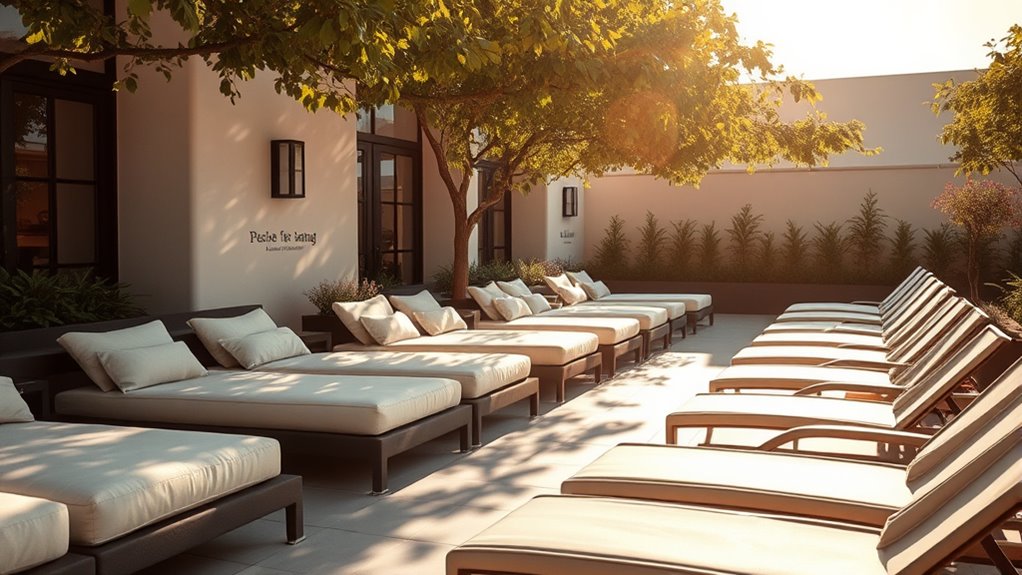
Setting expectations early about house rules helps create a respectful environment, especially when it comes to shared public spaces. You can promote etiquette by addressing behavior directly and calmly. To enforce respect, consider these actions:
- Observe personal space—if someone leaves a seat when you approach, respect their choice and find another spot. Public attitudes toward sharing park benches suggest that many view personal space as inviolable and may react emotionally if invaded. Recognizing the importance of personal space can prevent conflicts and promote comfort for all users.
- Arrange seating thoughtfully—use formations that encourage comfort and conversation without invading privacy.
- Communicate clearly—post signage about seat-saving policies and time limits to avoid misunderstandings.
- Intervene tactfully—if conflicts arise over loungers or saving seats, step in politely to remind everyone about shared etiquette.
Frequently Asked Questions
Are There Specific Hours When Daybeds and Loungers Can Be Reserved?
You can typically reserve daybeds and loungers during daytime hours, often between 10 a.m. and 6 p.m., depending on the resort’s policies. Some places restrict reservations to specific slots or only during pool operating hours. Make sure to check the resort’s reservation window, as some require bookings on the day of use, opening a few hours before. Arrive promptly and follow the rules to keep your spot.
Can I Share a Daybed or Lounger With Friends or Family?
Yes, you can share a daybed or lounger with friends or family. Just make sure there’s enough space for everyone to sit or lie comfortably, and communicate openly about preferences and boundaries. Respect each other’s privacy and comfort levels, and clean up after use. By being considerate and respectful, you’ll create a pleasant experience for everyone sharing the space. Always check if there are specific rules or guidelines beforehand.
What Should I Do if Someone Is Occupying a Seat I Reserved?
When you find someone occupying your reserved seat, don’t let it turn into a game of musical chairs. Politely show your reservation proof, like your ticket or app confirmation, and kindly ask them to move. If they refuse, avoid confrontation and seek assistance from staff. Remember, respecting reservations keeps the seating fair for everyone, and a calm approach often resolves the issue smoothly.
Are There Penalties for Leaving Belongings Unattended Beyond the Time Limit?
Yes, there can be penalties for leaving belongings unattended beyond the time limit. You might face your items being removed, considered abandoned, or even encounter legal consequences depending on local laws. In public spaces like libraries, risks include fines or sanctions for obstructing others or violating policies. To avoid issues, always keep your belongings attended or use designated storage options, and respect time restrictions to maintain proper etiquette.
How Can I Politely Ask Others to Respect My Reserved Seat or Daybed?
You can politely ask others to respect your reserved seat by approaching them with a friendly smile and saying, “Hi, I’ve reserved this spot and would appreciate your understanding.” Keep your tone respectful and calm. If they don’t move, involve staff instead of confrontation. Remember, clear communication and a respectful attitude help maintain a friendly environment and guarantee everyone feels comfortable at the pool.
Conclusion
By mastering these etiquette tips, you’ll turn everyday poolside lounging into an art form—avoiding chaos and transforming the space into a tranquil oasis. When you respect others’ spots, communicate clearly, and follow the rules, you’re not just saving a seat; you’re creating a peaceful sanctuary amid a sea of chaos. Embrace these practices, and watch as your poolside experience becomes an epic saga of harmony, comfort, and effortless elegance.
